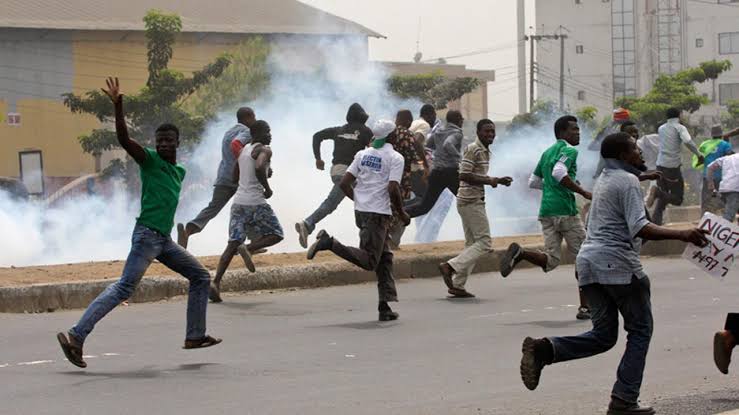Food Thieves, Looters Rampage As Nigerians Observe Lockdown Over COVID-19

Nearly one month since President Muhammadu Buhari declared an initial two-week lockdown in Abuja, Lagos and Ogun states and other states introduced measures to check the spread of COVID-19, there has been an increase in crime, reports say.
Over the period, there have been reports of looting of shops where foodstuffs are kept across the country as the economic hardship worsens.
On Wednesday, April 1, hoodlums violently disrupted the distribution of COVID-19 relief materials by the Lagos State Commissioner for Tourism, Uzamat Akinbile–Yussuf, in Oke-Odo Local Council Development Area.
The commissioner had to suspend the exercise and asked that the remaining items be returned to the council secretariat.
But the next day the mob gathered and “went to the secretariat and began destroying doors and offices to gain access to the store”.
The mob made bolder attempts on Saturday, April 11, moving in “about three buses” and broke into shops and houses in Ifako-Ijaiye and Alimosho local government areas.
They shot into the air in broad daylight, looted shops, especially those containing food items, and robbed people of their belongings, witnesses said.
“Shop owners had to run for their lives. Some houses were also attacked and were robbed of money and other valuables,” one resident in Agbado told reporters.
Similar criminal activities have been recorded in Ado Odo, Ota, and Ifo local government areas of Ogun State.
Earlier in the month, hoodlums in Yenagoa, Bayelsa, raided a government store and stole bags of rice, beans and garri prepared to be distributed to vulnerable households.
Some residents in Abuja were also seen in a footage recently circulated on the internet, risking their lives as they struggled to steal bags of rice from a moving truck on Tuesday, April 14.
Many Nigerians, especially in Lagos and Ogun states, had to resort to self-help by forming neighbourhood vigilante groups and keeping watch at night to ward off robbers.
These incidents have not come as a surprise as many expected a spike in criminal activities owing to worsening economic conditions and widespread food insecurity.
Prior to the lockdown, the Nigerian Army had made plans for the protection of government food warehouses from looters, according to a memo obtained by reporters.
The Federal Government has repurposed its National Social Investment Programmes, especially the Conditional Cash Transfer Programme, to meet urgent financial and nutritional needs during the lockdown.
The Minister of Humanitarian Affairs, Sadiya Farouq, said that only 25 per cent of Nigerians could benefit from the various items, although, according to the World Poverty Clock, as many as 48 per cent of Nigerians are extremely poor, 63 per cent of them dwelling in rural communities.
Two weeks ago, the president ordered the distribution of 150 trucks of rice seized by the Nigeria Customs Service to all the states of the federation through the Ministry of Humanitarian Affairs and Disaster Management.
The Federal Ministry of Agriculture and Rural Development also recently released 70,000 tonnes of assorted grains as palliative to be distributed to vulnerable Nigerians through the National Emergency Management Agency.
But many Nigerians have described the foodstuffs that reach each household as grossly inadequate, therefore the rise in crime.
Ben Okezie, a security analyst and Chief Executive Officer of BRANE Security, pointed out that hunger often forced people to seek help or forcibly make demands from others through crime.
He blamed the government’s approach to the pandemic, especially how it had been enforcing the lockdown, for the increase in crime.
“We have exposed Nigerians to physical harm by not providing enough palliatives for them,” Okezie said.
He said that people might be forced to disobey the lockdown in protest as a result of hunger in the coming days and that the situation might overwhelm the security operatives.
“You should expect more burglary, robbery, and vandalism because everything is going on for the criminals,” Okezie said.
The factors that make crime commoner, he explained, included the poor power supply, poorly lit streets, absence of security cameras and the fact that people were indoors and commercial stores not manned.
He said the few outdoors were more vulnerable because of the lockdown and urged the government to provide more stimulus packages and food as well as protective equipment for the security agencies.
He also recommended that more policemen and security operatives be deployed to various communities across the country.
“And they should patrol and not just sit at so-called checkpoints. They should move up and down in order to give residents a sense of safety,” he added.
Support Our Journalism
There are millions of ordinary people affected by conflict in Africa whose stories are missing in the mainstream media. HumAngle is determined to tell those challenging and under-reported stories, hoping that the people impacted by these conflicts will find the safety and security they deserve.
To ensure that we continue to provide public service coverage, we have a small favour to ask you. We want you to be part of our journalistic endeavour by contributing a token to us.
Your donation will further promote a robust, free, and independent media.
Donate Here




